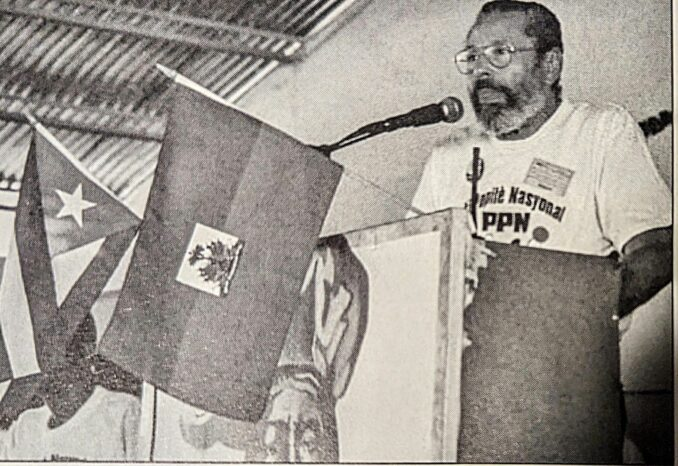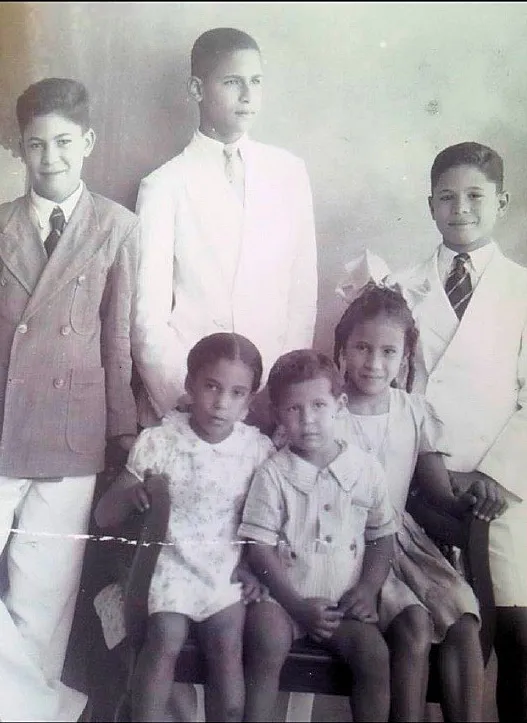More languages
More actions
Ben Dupuy | |
|---|---|
 | |
| Born | 1932/33 Haiti |
| Died | April 23, 2023 Miami, Florida, United States |
| Nationality | Haitian |
| Political orientation | Marxism |
| Political party | National Popular Assembly |
Benjamin Dupuy (1932/33 – April 23, 2023) was a Haitian Marxist and head of the National Popular Assembly. He helped create the movie Bitter Cane about the Duvalier regime and later wrote for the newspaper Haïti Progrès. He also served as an ambassador for President Jean-Bertrand Aristide. He frequently spoke to progressive and anti-war groups in the United States during the 1980s and 90s.[1]
Early life[edit | edit source]

Ben Dupuy was born in Cap Haïtien on September 30, 1931, as the fourth child among eight siblings. He spent his formative years in various cities such as Gonaïves, Aux Cayes, Port-au-Prince, and St. Marc. His father, Georges Dupuy, served as a senior officer in the Haitian Army, leading to the family's relocation to different military posts across the nation.[2]
Dupuy's mother, Anna Therese Anduoar Dupuy, was Dominican, which contributed to his near-fluency in Spanish.[2]
Early work life[edit | edit source]
Initially contemplating a religious vocation, Dupuy ultimately pursued a career as a civil engineer. His endeavors included involvement in diverse projects such as constructing irrigation canals in the Artibonite Valley and establishing a butter factory near Aux Cayes. In the latter location, an Army officer requisitioned his work Jeep to pursue the "Jeune Haiti" anti-Duvalierist revolutionaries who had landed near Jérémie in 1964.[2]
The successful insurgency led by Fidel Castro in Cuba's Sierra Maestra mountains, situated just across the Windward Passage, served as inspiration for both the ill-fated guerrilla incursion and Ben, alongside many of his contemporaries.[2]
Additionally, Dupuy contributed to the U.S. government-sponsored Geodesic Survey, which involved mapping Haiti's terrain and took him across the entirety of the country, akin to the size of Maryland. This experience ignited his imagination regarding the prospect of establishing a movement akin to Cuba's July 26th Movement.[2]
As an avid ham radio enthusiast, Dupuy would spend hours tuning into broadcasts from revolutionary Cuba. Simultaneously, he collaborated with figures such as renowned journalist Jean Dominique and his close friend at the time, Herby Widmaier, at Port-au-Prince's Radio Haiti.[2]
Near death experiences[edit | edit source]
Dupuy encountered numerous close calls with death. On one occasion, members of the Tonton Macoutes, Duvalier's notorious paramilitary force, nearly executed him and a companion after halting their vehicle, which bore resemblance to that of François Benoît, an Army sharpshooter suspected by François "Papa Doc" Duvalier of plotting to abduct his son, Jean-Claude, from school in 1963.[2]
Ultimately, a Tonton Macoute, later eliminated by Duvalier, cautioned Ben to flee the country, as he had been targeted for arrest due to his involvement in organizing strikes among workers at the Reynolds Metals bauxite mine in Miragoâne, where he was employed.[2]
References[edit | edit source]
- ↑ G. Dunkel (2025-05-05). "Ben Dupuy: Rest in power!" Workers World.
- ↑ 2.0 2.1 2.2 2.3 2.4 2.5 2.6 2.7 Kim Ives (2023-04-28). "Ben Dupuy, quintessential Haitian revolutionary leader, dead at 91" Struggle La Lucha. Archived from the original on 2024-02-16. Retrieved 2024-02-16.
